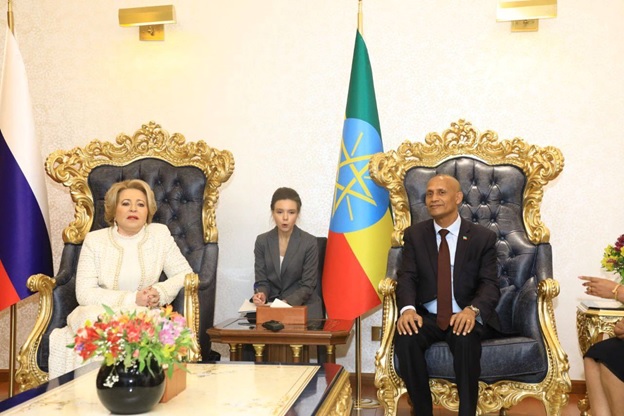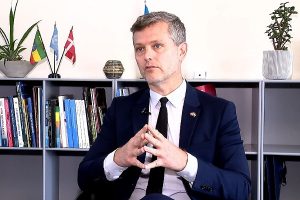
Ethiopia and Russia are exemplars of a strong and enduring relationship, marked by cooperation across various sectors and on the global stage. Recent developments underscore a growing strategic partnership, reflecting both nations’ ability to navigate the complexities of the modern international arena.
Historically, the ties between Ethiopia and Russia date back to the late 19th century. Over the years, these connections have evolved through periods of collaboration and shifts in global politics. Today, the emphasis is on bolstering economic, political, and strategic partnerships.
A significant milestone in this relationship was Ethiopia’s recent admission into the BRICS alliance, particularly during Russia’s presidency. This development is viewed as a major catalyst for enhancing bilateral relations, opening new avenues for economic cooperation and multilateral engagement.
Efforts to expand trade and investment between the two countries are underway, with a focus on sectors such as agriculture, energy and technology. High-level diplomatic exchanges and meetings further underscore the commitment to strengthening these ties, with ongoing discussions centered on trade, investment and security cooperation.
A recent visit by a high-level Russian delegation, led by Valentina Matvienko, Speaker of the Federation Council, highlighted this diplomatic engagement. The two-day official visit included senators, federal ministers, deputy ministers and heads of major Russian state corporations, showcasing a concerted effort to enhance relations.
During her visit, Matvienko met with Ethiopian Prime Minister Abiy Ahmed, who expressed on social media that it was a valuable opportunity to discuss and explore the potential of Ethio-Russian relations. This ongoing dialogue signifies a commitment to a mutually beneficial partnership that continues to grow in significance.
Matvienko emphasized that Ethiopia is one of Russia’s most important partners in Africa. In an interview with the Ethiopian News Agency (ENA), she explained that close inter-parliamentary cooperation between the two nations plays a crucial role in enhancing political dialogue across various levels.
Matvienko highlighted ongoing collaboration through the Inter-Parliamentary Union, recalling Ethiopia’s participation in the 10th anniversary events of the BRICS Parliamentary Forum in St. Petersburg last year. This participation aimed to strengthen the role of parliaments in promoting fair global development and security.
Reflecting on her discussions with Agegnehu Teshager, Speaker of Ethiopia’s House of Federation, Matvienko noted, “I was deeply impressed by Agegnehu Teshager’s brilliant statement. It became evident that the Ethiopian-Russian inter-parliamentary dialogue represents a conversation among like-minded individuals striving for a better world order.”
She reiterated the historical significance of the relationship, stating, “Ethiopia was the first African nation to establish official diplomatic ties with Russia. This year marks the 127th anniversary of our diplomatic relations, built on respect, trust and equal partnership.”
Matvienko pointed out that high-level meetings continue to propel bilateral relations forward. Over the past two years, Prime Minister Abiy Ahmed has visited Russia twice: first in July 2023 for the Second Russia-Africa Summit in St. Petersburg, and again in October 2024 during the BRICS Summit in Kazan.
During a meeting with Matvienko, Agegnehu underscored the enduring nature of the Russia-Ethiopia relationship, expressing gratitude for Russia’s support during UN Security Council discussions that concern Ethiopia’s national interests. He also acknowledged Russia’s backing for Ethiopia’s BRICS membership.
Agegnehu emphasized the need for both nations to enhance parliamentary interactions, sharing knowledge and technical support to foster parliamentary democracy and cultural values. He reiterated Ethiopia’s commitment to elevating its strategic partnership with Russia while strengthening ties with neighboring countries.
Matvienko confirmed that Russia will continue to bolster cooperation in economic, technological, health, and energy sectors, as well as cultural development. Agegnehu highlighted the importance of leveraging their shared history to enhance trade, investment and technological collaboration.
The delegation visiting Ethiopia is reportedly the largest Russian envoy to date, signaling a new era of cooperation across various sectors. Discussions focused on enhancing economic ties, with both sides exploring ways to access each other’s markets. Ethiopia’s potential in energy, mining, and agriculture was highlighted, alongside interest in Russian expertise in large-scale farming, peaceful nuclear energy, and advanced technologies like artificial intelligence and ICT.
Ethiopia, rich in natural gas reserves, seeks Russian investment in energy exploration and production, as well as collaboration in fertilizer production and agricultural machinery. Conversely, Russia views Ethiopia as a strategic gateway to the African market, offering opportunities for trade expansion and investment in infrastructure.
Agegnehu noted the goal of establishing a more balanced trade relationship, with Ethiopia aiming to increase exports of coffee, minerals, and other commodities to Russia. Beyond economic discussions, the talks also addressed strengthening parliamentary relations and institutional collaboration.
He described BRICS as a vital platform for emerging economies, reiterating Ethiopia’s commitment to expanding global trade and cooperation through such frameworks. As BRICS grows, its member states are set to represent a significant share of the global population and economy, making it an essential arena for Ethiopia’s international engagement.
On Valentina Matvienko, Speaker of the Russia Federation Council meeting with President Taye Atske Selassie, discussions centered on strengthening political and economic ties are raise.
The relationship between Ethiopia and Russia is also evolving in the media sector, highlighted by the launch of Sputnik International’s African bureau in Addis Ababa. This initiative underscores the commitment to deepening bilateral relations.
The bureau aims to respect Ethiopia’s national interests while employing local journalists to ensure a voice for Ethiopia and Africa. Matvienko stated that the establishment of Sputnik Africa is crucial for enhancing Russia’s cooperation with the continent, focusing on cultural ties and accurate information dissemination.
Agegnehu expressed optimism that the bureau’s global reach will help showcase Ethiopia’s realities to the world, reinforcing cooperation between the two nations. He affirmed that the Ethiopian government and the House of Federation will support the media outlet’s success, marking yet another step forward in strengthening the relationship between Ethiopia and Russia.
The evolving partnership between Ethiopia and Russia signifies a robust commitment to mutual growth and cooperation across various sectors. With a rich historical backdrop and recent strategic developments, including Ethiopia’s membership in BRICS and the establishment of Sputnik Africa’s bureau in Addis Ababa, both nations are poised to enhance their diplomatic and economic ties. As high-level discussions continue to foster collaboration in trade, technology, and culture, the future looks promising for this enduring relationship. The commitment from both governments to support and strengthen these connections reflects a shared vision for a prosperous and equitable global landscape.
BY EYUEL KIFLU
THE ETHIOPIAN HERALD TUESDAY 25 FEBRUARY




